November Revolution. How the Second Reich died
Revolution
October 29 - 30, 1918 in the port of Wilhelmshaven unrest of German sailors began fleetthat became the fuse for the revolution. The reason for the speech was the suicidal plan of the German Admiral of the High Seas Fleet, Reinhard Scheer, about entering the sea on the “last decisive battle” with the British fleet. The High Sea Fleet (German: Hochseeflotte) is the main navy of the German Kaiser Navy during the First World War, which was based in Wilhelmshaven. The German fleet posed a constant threat to the British Isles and forced the British Grand Fleet (the Big Fleet defended the metropolis) to remain in the North Sea area throughout the war. The British were superior in strength, so the High Seas Fleet avoided open clashes with the Grand Fleet and preferred a strategy of raids into the North Sea in order to lure part of the enemy fleet, cut it off from the main forces and destroy it.
In October, 1918, in the face of defeat in the war and popular discontent, Admiral Scheer decided to launch a desperate attack on the British fleet. The admiral was afraid of the internment of the main forces of the German fleet during the negotiations and wanted to preserve the "honor of the flag." Although such a battle was suicidal: the practical balance of forces in the main classes was 2 to 1 in favor of the British fleet; Germans had only two ships with a caliber artillery 305 millimeters, British Navy included 12 superdreadnoughts with 343-millimeter guns, 2 superdreadnought (US) with 356-mm guns and 10 superdreadnoughts with 381-millimeter guns; the British had a significant superiority in high-speed ships; British fleet combat training significantly exceeded the German one, since the British fleet in 1916 - 1918 operated much more actively and conducted intensive exercises; prolonged inaction adversely affected the fighting spirit of the crews of German ships, in the 1917 year began the decomposition of the fleet. Knowing that such an operation would not be supported by the new liberal government of Maximilian of Baden, he did not inform the government about his plans.
24 October 1918 issued instructions of Admiral Scheer, according to which the German navy of the high seas were ordered to wage the “last decisive battle” against the British fleet. Formally, the plan suggested another attempt to lure the British fleet into a trap (in an ambush of previously deployed submarines). Before the planned battle, the German fleet embarked on the anchorage near Wilhelmshaven. Here, on the night of 29 on 30 of October, 1918 of the year, part of the crews of the Thuringia and Helgoland battleships refused to carry out the military order, saying that it was meaningless and the order even contradicted the course of peaceful negotiations with the enemy taken by the new government. The crews of the ships that remained loyal to the oath pushed the guns at the rebels and forced them to return to the port of Kiel on November 1. More than a thousand sailors were arrested. But fermentation in the sailor's environment began to spread to other teams, since by that time there had already been an underground sailor anti-war organization in Kiel. The sailors, who were on shore in the layoffs, came to the building of the trade unions of Kiel, where they met with their representatives, as well as activists of the Social Democrats. The police broke up this meeting, but its participants agreed to hold a rally in support of the sailors the next day.
Battleship Thuringia
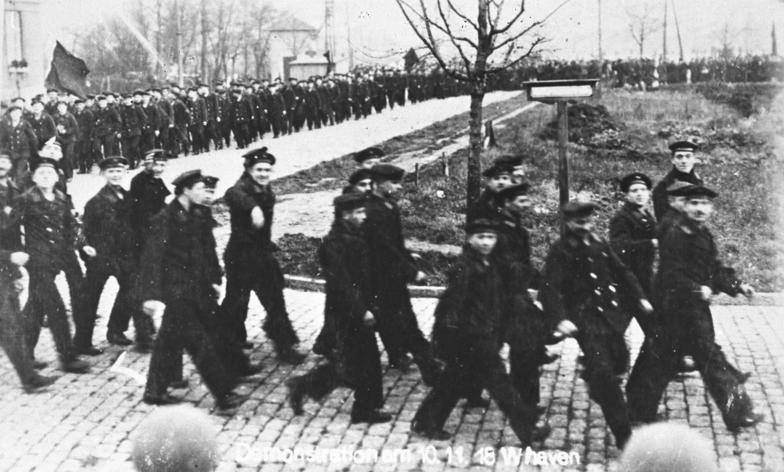
Demonstration of sailors in Kiel
On November 2, it was decided to hold another big demonstration at the rally the next day. On November 3, thousands of citizens and sailors took to the streets of Kiel, demanding the release of their comrades, "bread and peace", but they were stopped by soldiers who opened fire on the crowd. 9 was killed and 29 people were injured. In response, the sailors attacked the soldiers, took them weapon and shot the lieutenant commanding the execution. The governor of the Baltic ports, Admiral Wilhelm Souchon, alarmed by the situation in Kiel, ordered that troops loyal to the Kaiser be summoned to the city and suppress the rising insurgency. However, the soldiers who arrived in the city, for the most part also went over to the side of the rebels. During a shootout with soldiers who remained loyal to the government, they triumphed, and by the evening of November 4, all of Kiel was in the hands of the rebels. The sailors elected the first in the course of the German revolution a council of workers and soldiers' deputies headed by a sailor - Social Democrat Karl Artelt. On all ships, except for one that had gone to sea, red flags were raised, and the arrested sailors were released. The only victim that day was the captain of the battleship "König" Veniger, who tried to prevent the red flag from being raised on the mast and shot for it.
The insurgent sailors and residents of Kiel made their appeal to the people and the government of Germany - the so-called. "14 Kiel points." They included such demands: the release of all those arrested and political prisoners; cancellation of postal censorship; freedom of speech and press; proper treatment of the authorities with the team; the return of all comrades to the ships and to the barracks without punishment; prohibition of the fleet’s entry into the sea under any circumstances, etc.
The suppression of the uprising, the government of Max Badenski, entrusted Gustav Noske, one of the Social Democrats' right-wing leaders. 4 November, he arrived in Kiel to appease the rebels. Noske heads the movement to form the Council of Sailors. Over the next few weeks, with his actions, he was able to reduce the Council’s influence in Kiel. However, the revolution is already spreading throughout Germany. With their rebellion, the sailors gave the signal to the rebellion of the whole empire. Together with the workers, they took power in Kiel and around the coast. The German revolutionaries are adopting the slogan: “Form the Soviets!” Over the next few days, revolutionary Soviets were created in many German cities, calling upon Emperor Wilhelm II to abdicate the throne. In the Reichstag, most of the deputies of the Social Democrats demanded the abdication of the emperor. Not having received the support of the majority, they withdrew from the Reichstag and called upon the working people of the country to go on a general strike. November 7 mass demonstrations began in Munich. They were led by the radical Social Democrat Kurt Eisner, who proclaimed the local Bavarian king, Ludwig III, deposed, and Bavaria the socialist republic. On November 8, a new government in Bavaria was formed, with Eisner as Prime Minister. November 9 The 1918 revolution began in Berlin. Many sailors arrived in Berlin. Their squads formed the People’s Marine Division. The sailors captured the War Office and the Imperial Chancellery, the Navy Directorate, the city commandant's office, the building of the Main Naval Staff, and the castle and stables. Workers and soldiers began to create their own Soviets. The local garrison moved to the side of the Berlin Soviets.
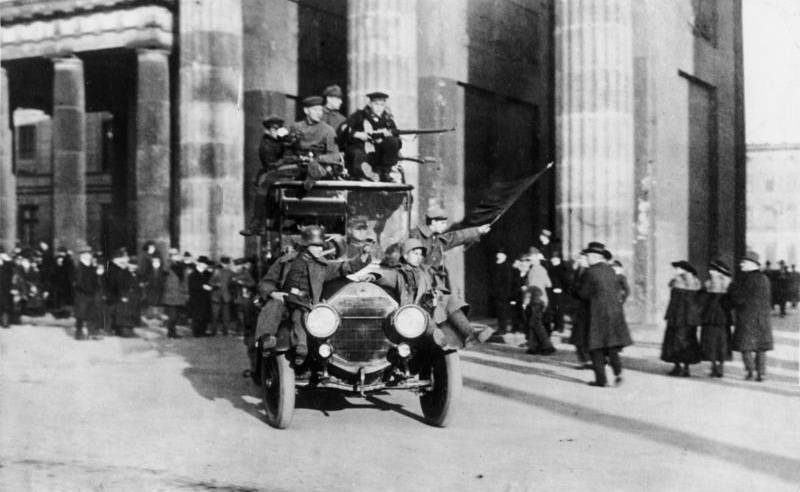
Revolutionary soldiers and sailors at the Brandenburg Gate in Berlin. November 1918 of the year
It is worth noting that the German councils differed significantly from the Russian ones: the soldiers' councils included officers, the workers were trade union and social democratic leaders. Therefore, the revolution in Germany took a less radical nature than in Russia. And separate speeches of the left radicals and communists were relatively quickly suppressed. The German bourgeoisie entered into an alliance with the generals and officers, used to fight the left-radical forces of demobilized soldiers, of whom they began to quickly put together right-wing movements and parties (the foundation of the future National Socialist Party).
In the meantime, the external situation also sharply worsened. October 30 capitulates Turkey, signing the Mudros truce. November 3 in Padua capitulates the last ally of Germany - Austria-Hungary. 5 November, the German front was broken, and the next day began a general retreat of the German army.
Wilhelm II did not want to leave the throne. Chancellor Maximilian of Baden urged Wilhelm to renounce at least in order to prevent a civil war in Germany already seized by the revolution. But Wilhelm, who was at the headquarters in Spa, preferred to contact the generals and prepare a “march to Berlin”. Kaiser hoped that even if he would lay down the imperial crown, he would be able to retain the title of King of Prussia. But the generals, including a staunch monarchist, Chief of the General Staff Paul von Hindenburg, said they would not comply with such an order.
Then Max Badensky decided that it was impossible to retain power, and to maintain order, it should be passed on as soon as possible to moderate Social Democrats (SPD) so that radicals would not seize power. At noon on November 9, on his own initiative, he announces the Kaiser’s abdication of both thrones (Prussian and Imperial) and also his resignation. He transferred the powers of the head of government to the leader of the Social Democrats, Friedrich Ebert. After that, Comrade Ebert on the Social Democratic Party, Secretary of State in the government of Max Baden, Philip Scheidemann announced the fall of the monarchy and declared Germany a republic. 10 November The General Assembly of Berlin Workers and Soldiers' Councils elected interim bodies of state power - the Executive Council of Workers' and Soldiers' Councils of Greater Berlin and the Council of People's Representatives. The new German government, called the “Council of People's Representatives”, consisted of 3 representatives of the SPD and 3 representatives of the Independent Social Democratic Party of Germany (NSDPG). However, the main positions in the new government belonged to the members of the SPD. In 1919, Ebert will be the first president of Weimar Germany, and Scheidemann will be her first chancellor.
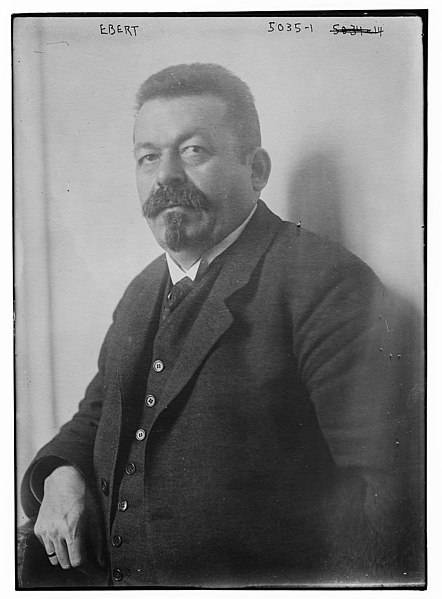
The first Reich Chancellor of Germany after the November Revolution 1918 of the year, the first president of Germany Friedrich Ebert
Emperor Wilhelm, having received assurances from General V. Groener that it was impossible to restore the monarchy, went to the Netherlands on November 10 in the evening, where he denied both thrones 28 in November, declaring: “I’ll forever reject the rights to the crown of Prussia and with it the right to the German imperial the crown. " After the Versailles Peace Treaty was signed, the Entente countries demanded the issuance of the fugitive Kaiser as the main war criminal to convict him of violating peace and quiet in Europe, but the Queen of the Netherlands managed to protect him. Until the end of his days, Wilhelm lived without a break in the Netherlands. He will still have time, in connection with the fall of France 24 June 1940, to send a congratulatory telegram to Hitler. Wilhelm will die in June 1941, at the age of 82.
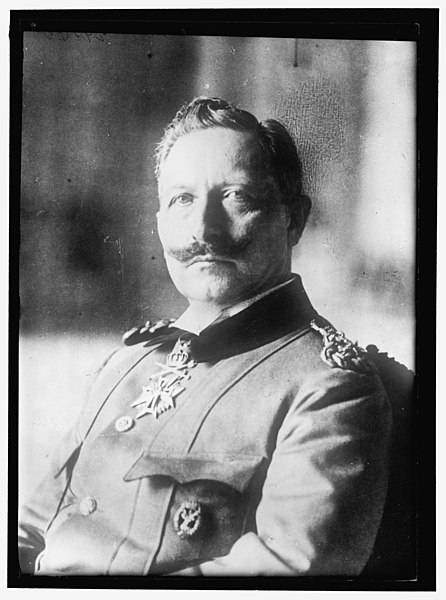
Kaiser Wilhelm II. Photo source: https://ru.wikipedia.org
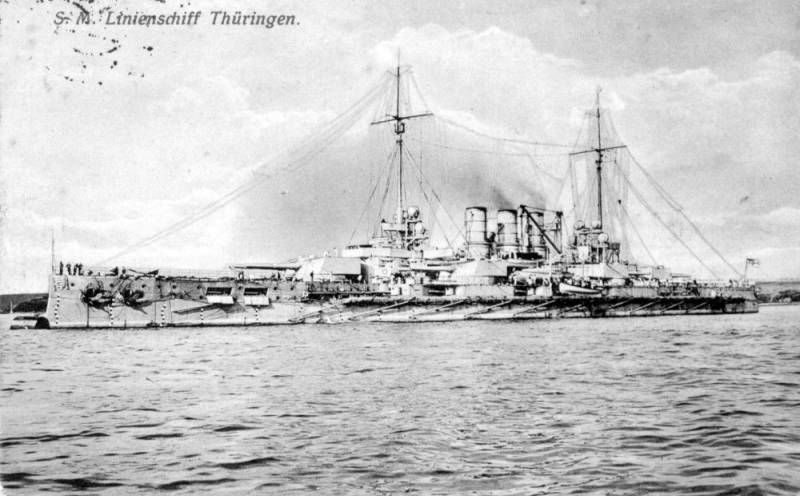
Information